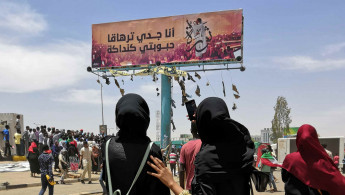Sudan's military council urges political parties to select 'independent' prime minister
After months of widespread popular protests, the military on Thursday overthrew Bashir - just shy of 30 years in power - and set up a military council it says will rule the country for the next two years.
Leading protest organisers the Alliance for Freedom and Change (AFC) on Saturday met with the military council to put forward their demands, including the establishment of a civilian government, the restructure of the country's security services, and and end to any laws curtailing freedoms.
Later the military council met with Sudan's political parties and asked them to agree on an "independent figure" who could be the country’s prime minister, AFP reported.
"We want to set up a civilian state based on freedom, justice and democracy," Lieutenant General Yasser al-Ata, a member of the military council, told several political parties.
Ata also urged the political parties to agree on the future members of a civilian government.
The AFC has insisted that civilian representatives join the military council immediately to oversee the country's democratic transition, and that a fully civilian government be established to run day-to-day affairs.
While Sudan has a variety of political parties, the protest movement against Bashir and the Sudanese regime has been led by non-aligned, independent groups, such as the Sudanese Professionals Association (SPA), who have gained much support over the course of the past few months.
The opposition Umma Party, led by former premier Sadiq al-Mahdi who was overthrown in a military coup by Bashir in 1989, backed the protests against the regime, and opposition politicians were arrested during protests in the past few months.
"I know [the opposition parties] have come together against Bashir, but some of them just kept observing... and me and my sisters were on the street," Mohamed, a Sudanese citizen who attended multiple protests against Bashir, told The New Arab a day before Bashir was overthrown.
"Those political parties will come after the revolution and will fight again to claim authority."
Follow us on Twitter: @The_NewArab





 Follow the Middle East's top stories in English at The New Arab on Google News
Follow the Middle East's top stories in English at The New Arab on Google News
![Israeli forces ordered bombed Gaza's Jabalia, ordering residents to leave [Getty]](/sites/default/files/styles/image_330x185/public/2176418030.jpeg?h=a5f2f23a&itok=_YGZaP1z)

